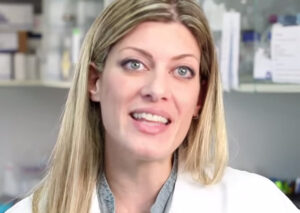INTERVIEWS
Narrowing the gap between science and society
15.09.2023
by Maria Koumouri
SHARE
Dr Myrtani Pieri started her academic journey at the University of Patras where she studied Biology. She then moved to the University of Oxford, UK where she completed her PhD in Molecular Biology and Genetics. She is currently an Associate Professor at the University of Nicosia in Human Physiology. Meanwhile, she is very interested in communicating science-related topics and the scientific way of thinking to the general public. It is time to bring the scientific community closer to the society and create a trusty relationship between them, she says. !
Tell us about your research interests and your current research focus.
I am very interested in the connection between the environment and our health, particularly the environment that we consume through food and how we digest it. Whenever we eat, we not only absorb essential nutrients such as carbohydrates, proteins and vitamins, but we also ingest nucleic acids, such as DNA and RNA. Thus, we eat the DNA and RNA of plants, animals and even bacteria in our yogurt! Although it is commonly understood that these nucleic acids are completely broken down in the consumer’s gastrointestinal tract during digestion, recent research suggests that some small RNA molecules, known as microRNAs, may behave differently. MicroRNAs from plants and animals that we consume have been found in the bloodstream of consumers, which contradicts the general belief that nucleic acids are completely broken-down during digestion. This raises the possibility of a new way of viewing nutrition, as these microRNAs can act as “switches” that have the ability to turn genes on or off. My work centres on this brand new and rather controversial field of ingested exogenous microRNAs and their potential protective or pathogenic effects on the consumer. Is it time to consider nutrition not just as the intake of nutrients, but also as the intake of information? So, “do we eat gene regulators”?
Since 2020, you are also a member of the prestigious Global Young Academy (GYA). Tell us about your role at the organization.
Global Young Academy (GYA) is a global network of scientists involved in innovative interdisciplinary research using their voices to influence science policy and high-level science advice. In GYA, I have the opportunity to contribute to the global interdisciplinary work of the Academy, which focuses on science and policy, on education and outreach, and on strengthening high-profile international networks of researchers. Adding in this way my voice to the emerging cohort of global scientific leadership, sharing research excellence and passion about the role of science in creating a better world. The term is for five years and UNIC has been greatly supporting this role.
Apart from your academic role, you are an active science communicator by organizing and participating in many science outreach activities. When did you first come across this area?
My first experience with science outreach and communication was in 2011, when I decided to participate in a science communication competition called Famelab. The competition focused on spreading communicating science in a simple and engaging way for the general public. During the competition, I was fortunate to take part in science communication workshops from some of the top science communicators in the world, and that’s how my interest in science communication began, in a more formal way.

What are your current Sci-com-related activities?
In 2015 together with some friends that share the passion of science communication we established an NGO named Scico Cyprus. Scico is a non-profit, educational organization that promotes the communication of science, technology, and innovation to diverse audiences through a variety of interactive and entertaining methods. Besides the wide range of actions that Scico is involved in such as organization of Science festivals and STEAM workshops, I am also very interested in Scicom student actions here in Cyprus. For instance, every year my students at UNIC take part in the European Researchers’ Night. This summer I was part of a team of Greek-Cypriots and Turkish-Cypriots friends that we run the Steam for PEACE and Entrepreneurship Camp together, where 100 kids from all over the island of Cyprus did experiments together, had fun together, played and learned by utilizing the common and universal language of science. The feedback from the project was amazing and we truly believe that this camp brought these kids together, across and over buffer zones and green lines.
It is clear that you are actively involved in many science outreach activities apart from your responsibilities as an Associate Professor and Researcher. How do you manage to combine both?
I am fortunate enough to work in an organization-The University of Nicosia- that fully supports my science outreach roles. Even though research and teaching are very important pillars in academic growth, offering to the public, as in the form of science communication or science diplomacy/advice, is still much appreciated and promoted.
Based on your experience, how important is science communication for scientists and their audience?
Science communication is extremely important for both scientists and their audience. Scientists have a responsibility to communicate their research to the general public and to other scientists in a way that is accurate, understandable, and relevant. But when doing so we need to be honest, accurate and introduce people to the scientific way of thinking: a non-dogmatic way of thinking that is altered based on new data emerging. This helps to ensure that the public has access to reliable information about scientific issues, and it also helps to build trust and understanding between scientists and the general public. For scientists, effective science communication can help to increase the impact and reach of their research, as well as foster collaboration and dialogue with other scientists and the public. It can also help to improve the perceived value and relevance of science to society, and can increase funding and support for scientific research. For the general public, science communication is important because it helps to increase understanding and literacy about science, which can inform decision-making and policy. Look at the recent COVID-19 pandemic and the infodemic it created.
According to you, what changes should be made in Academia so that science communication will be promoted?
Universities can make it clear that science communication is an important part of an academic’s responsibilities by including it as a criterion for promotion and tenure. This could involve setting specific targets or goals for science communication, such as giving a certain number of public lectures or writing a certain number of articles for a general audience. Universities can provide resources and support to help professors with their science communication efforts. This could include providing training and education in science communication, as well as funding and support for public engagement activities. In addition, they can recognize and reward the science communication achievements of their professors through things like awards, grants, and other forms of recognition. This can help to encourage more professors to engage in science communication and to make it a more valued part of their academic careers. Also, universities should encourage professors to integrate science communication into their teaching and research, such as by incorporating real-world examples and applications of their research into their lectures. The overall goal I think should be to foster a culture of outreach and public engagement within the universities to try and narrow the gap between science and society.
Find out more about Myrtani here !

RELATED ARTICLES

A little bit of science in a big magic world
Potterheads, this is for you!

Nature’s 10: ten people who helped shape science in 2020
Nature recognized these people as keys to shape 2020

Archive
Find all our past articles chronologically organized in our archive.
CONTACT US
____________
greekwomeninstem@gmail.com
Do you have ideas, questions, comments or special requests?
Would you like to highlight your research project or nominate a researcher that you would like to learn more about?
Please write to our email or fill out the form and hit “send”. We will be happy to talk with you!
[contact-form-7 id=”44″ title=”Contact form 1″]

